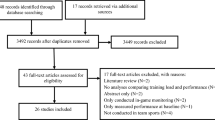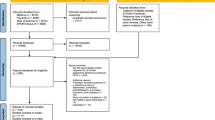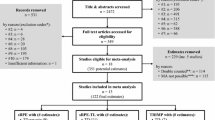Abstract
The general purpose of this systematic review was to study the effectiveness of off-court perceptual–cognitive training interventions in nonnovice, interactive sport athletes. We looked at task-specific practice effects and, more importantly, the transfer of effects. Databases used for the literature search were PubMed, Web of Science, and PsycINFO. In all, 16 studies were found to be eligible for this review. These studies were independently evaluated by four reviewers for methodological quality and their evidence for specific practice effects and transfer effects. The effectiveness was analyzed with respect to the level of transfer, i. e., from training-task-specific effects to near-transfer (e. g., a similar perceptual task), further-transfer (e. g., a sensorimotor sports skill), and far-transfer (e. g., competition performance) intervention effects. Analyses of the 16 included studies suggest that around 60% of the training-specific measures tested after off-court practicing perceptual–cognitive training in sports athletes signal performance enhancement. However, transfer, be it near, further or far, is mostly not studied empirically; if studied, there is currently only limited and weak evidence for intermediate and far transfer. To reason that perceptual–cognitive off-court training interventions are ineffective might be premature at this point of time as methodological quality can still be improved and only a very limited number of studies actually included transfer variables. In those few studies integrating transfer variables, results are mixed and inconsistent. Future work should focus on critical factors to assure transfer of perceptual–cognitive training interventions.
Zusammenfassung
Zweck dieses systematischen Reviews war die Untersuchung der Effektivität von off-court perzeptiv-kognitiven Trainingsinterventionen bei fortgeschrittenen Sportlern in interaktiven Sportarten. Wir betrachteten aufgabenspezifische Übungseffekte und insbesondere den Transfer von Effekten. Die Datenbanken PubMed, Web of Science und PsycINFO wurden für die Literaturrecherche verwendet. Insgesamt 16 Studien wurden gefunden, die sich für dieses Review eigneten. Diese Studien wurden von vier unabhängigen Gutachtern bezüglich ihrer methodologischen Qualität und ihrer Evidenz für spezifische Übungseffekte und Transfereffekte beurteilt. Die Analyse der Effektivität erfolgte mit Bezug auf die Transferebene, d. h. von trainingsaufgabenspezifischen Effekten bis hin zu Interventionseffekten mit nahem Transfer (z. B. eine ähnliche Wahrnehmungsaufgabe), mittlerem Transfer (z. B. eine sensomotorische sportliche Fähigkeit) und weitem Transfer (z. B. Wettkampfleistung). Die Analysen der 16 eingeschlossenen Studien zeigen, dass rund 60% der trainingsspezifischen Maßnahmen, die nach einem off-court perzeptiv-kognitiven Training bei Sportlern untersucht wurden, auf eine Leistungsverbesserung hindeuten. Jedoch ist der Transfer – sei er nah, mittel oder weit – meist nicht empirisch untersucht; wenn er untersucht wurde, so existiert derzeit nur limitierte und schwache Evidenz für mittleren und weiten Transfer. Das Argument, off-court perzeptiv-kognitive Trainingsinterventionen seien unwirksam, könnte zu diesem Zeitpunkt voreilig sein, da die methodologische Qualität immer noch verbessert werden kann und nur wenige Studien Transfervariablen eingeschlossen haben. Die Ergebnisse der wenigen Studien, die Transfervariablen eingeschlossen haben, sind gemischt und inkonsistent. Zukünftige Arbeiten sollten sich auf bestimmte kritische Faktoren konzentrieren, um den Transfer von perzeptiv-kognitiven Trainingsinterventionen zu sichern.






Similar content being viewed by others
References
Alsharji, K. E., & Wade, M. G. (2016). Perceptual training effects on anticipation of direct and deceptive 7‑m throws in handball. Journal of Sports Sciences, 34(2), 155–162. doi:10.1080/02640414.2015.1039463.
Balasaheb, P. M., & Sandhu, J. S. (2008). The impact of visual skills training program on batting performance in cricketers. Serbian Journal of Sports Sciences, 2(1), 17–23.
Bavelier, D., Green, C. S., Schrater, P., & Pouget, A. (2012). Brain plasticity through the life span: Learning to learn and action video games. Annual Reviews of Neuroscience, 35, 391–416.
Broadbent, D. P., Causer, J., Williams, A. M., & Ford, P. R. (2015). Perceptual-cognitive skill training and its transfer to expert performance in the field: Future research directions. European Journal of Sport Science, 15(4), 322–331. doi:10.1080/17461391.2014.957727.
Button, K. S., Ioannidis, J. P., Mokrysz, C., Nosek, B. A., Flint, J., Robinson, E. S., & Munafò, M. R. (2013). Power failure: Why small sample size undermines the reliability of neuroscience. Nature Reviews Neuroscience, 14(5), 365–376. doi:10.1038/nrn3475.
Calamia, M., Markon, K., & Tranel, D. (2012). Scoring higher the second time around: Meta-analyses of practice effects in neuropsychological assessment. The Clinical Neuropsychologist, 26(4), 543–570. doi:10.1080/13854046.2012.680913.
Cañal-Bruland, R., Hagemann, N., & Strauß, B. (2005). Aufmerksamkeitsbasiertes Wahrnehmungstraining zur taktischen Entscheidungsschulung im Fußball. Zeitschrift für Sportpsychologie, 12(2), 39–47. doi:10.1026/1612-5010.12.2.39.
Elferink-Gemser, M.-T., Visscher, C., Lemmink, K. A. P. M., & Mulder, T. (2007). Multidimensional performance characteristics and standard of performance in talented youth field hockey players: A longitudinal study. Journal of Sports Sciences, 25(4), 481–489. doi:10.1080/02640410600719945.
Farrow, D., & Abernethy, B. (2002). Can anticipatory skills be learned through implicit video-based perceptual training? Journal of Sports Sciences, 20(6), 471–485. doi:10.1080/02640410252925143.
Farrow, D., Chivers, P., Hardingham, C., & Sachse, S. (1998). The effect of video-based perceptual training on the tennis return of serve. International Journal of Sports Psychology, 23, 231–242.
Faubert, J. (2013). Professional athletes have extraordinary skills for rapidly learning complex and neutral dynamic visual scenes. Scientific Reports, 3. doi:10.1038/srep01154.
Faul, F., & Erdfelder, E. (1992). GPOWER: A priori, post-hoc, and compromise power analyses for MS-DOS [Computer program]. Bonn: Bonn University, Department of Psychology.
Fleiss, J. L., Levin, B., & Paik, M. C. (2003). Statistical methods for rates and proportions. New York: Wiley.
Fröhlich, M. (2009). Überlegungen zum Trainingsbegriff und zur Theorie des Trainings aus ökonomischer Perspektive. Leipziger Sportwissenschaftliche Beiträge, 50(2), 8–35.
Gabbett, T., Rubinoff, M., Thorburn, L., & Farrow, D. (2007). Testing and training anticipation skills in softball fielders. International Journal of Sports Science and Coaching, 2(1), 15–24. doi:10.1260/174795407780367159.
Godefroy, D., Rousseu, C., Vercruyssen, J. C., & Brisswalter, J. (2002). Influence of physical exercise on perceptual response in aerobically trained subjects. Perceptual & Motor Skills, 94(1), 68–70.
Gorman, A. D., & Farrow, D. (2009). Perceptual training using explicit and implicit instructional techniques: Does it benefit skilled performers? International Journal of Sports Science and Coaching, 4(2), 193–208. doi:10.1260/174795409788549526.
Green, C. S., & Bavelier, D. (2015). Action video game training for cognitive enhancement. Current Opinion in Behavioral Sciences, 4, 103–108. doi:10.1016/j.cobeha.2015.04.012.
Green, C. S., Strobach, T., & Schubert, T. (2014). On methodological standards in training and transfer experiments. Psychological Research, 78(6), 756–772. doi:10.1007/s00426-013-0535-3.
Hagemann, N., & Memmert, D. (2006). Coaching anticipatory skill in badminton. Laboratory- versus field-based perceptual training? Journal of Human Movement Studies, 50, 381–398.
Heppe, H., Kohler, A., Fleddermann, M.-T., & Zentgraf, K. (2016). The relationship between expertise in sports, visuospatial, and basic cognitive skills. Frontiers in Psychology, 7, 904. doi:10.3389/fpsyg.2016.00904.
Hodges, N., Starkes, J. L., & MacMahon, C. (2006). Expert performance in sport: A cognitive perspective. In K. A. Ericsson, N. Charness, P. J. Feltovich & R. R. Hoffmann (Eds.), The Cambridge handbook of expertise and expert performanc e (pp. 471–488). New York: Cambridge University Press.
Hohmann, A., Lames, M., & Letzelter, M. (2007). Einführung in die Trainingswissenschaft. Wiebelsheim: Limpert.
Hohmann, T., Obeloer, H., Schlapkohl, N., & Raab, M. (2016). Does training with 3D videos improve decision-making in team invasion sports? Journal of Sports Sciences, 34(8), 746–755. doi:10.1080/02640414.2015.1069380.
Hopwood, M., Mann, D., Farrow, D., & Nielsen, T. (2011). Does visual-perceptual training augment the fielding performance of skilled cricketers? International Journal of Sports Science and Coaching, 6(4), 523–536. doi:10.1260/1747-9541.6.4.523.
Kitchenham, B., Brereton, O. P., Budgen, D., Turner, M., Bailey, J., & Linkman, S. (2009). Systematic literature reviews in software engineering – a systematic literature review. Information and Software Technology, 51(1), 7–15.
Larkin, P., Mesagno, C., Spittle, M., & Berry, J. (2015). International Journal of Sport Psychology, 46, 555–586.
Lee, T. D. (1988). Testing for motor learning: A focus on transfer-appropriate processing. In O. G. Meijer & K. Roth (Eds.), Complex motor behaviour: “The” motor-action controversy (pp. 210–215). Amsterdam: Elsevier.
Letzelter, M. (1978). Trainingsgrundlagen. Reinbek: Rowohlt.
Li, R., Polat, U., Scalzo, F., & Bavelier, D. (2010). Reducing backward masking through action game training. Journal of Vision, 10(14). doi:10.1167/10.14.33.
Loffing, F., Hagemann, N., & Farrow, D. (2017). Perceptual-cognitive training: The next piece of the puzzle. In J. Baker, S. Cobley, J. Schorer & N. Wattie (Eds.), Routledge Handbook of Talent Identification and Development in Sport. London: Routledge.
Lorains, M., Ball, K., & MacMahon, C. (2013). An above real time training intervention for sport decision making. Psychology of Sport and Exercise, 14(5), 670–674. doi:10.1016/j.psychsport.2013.05.005.
Mann, D. T. Y., Williams, A. M., Ward, P., & Janelle, C. M. (2007). Perceptual-cognitive expertise in sport: A meta-analysis. Journal of Sport and Exercise Psychology, 29(4), 457–478.
Milazzo, N., Farrow, D., & Fournier, J. F. (2016). Effect of implicit perceptual-motor training on decision-making skills and underpinning gaze behavior in combat athletes. Perceptual and Motor Skills, 123(1), 300–323. doi:10.1177/0031512516656816.
Moher, D., Liberati, A., Tetzlaff, J., & Altman, D. G. (2009). Preferred reporting items for systematic reviews and meta-analyses: The PRISMA statement. British Medical Journal, 339, 332–336. doi:10.1136/bmj.b2535.
Morgan, S., & McPherson, S. L. (2013). Developing tactics. In D. Farrow, J. Baker & C. MacMahon (Eds.), Developing sport expertise (pp. 231–244). London and New York: Routledge.
Newell, A., & Rosenbloom, P. S. (1981). Mechanisms of skill acquisition and the law of practice. In J. R. Anderson (Ed.), Cognitive skills and their acquisition (pp. 1–55). Hillsdale, NJ: Erlbaum.
Nimmerichter, A., Weber, N., Wirth, K., & Haller, A. (2016). Effects of video-based visual training on decision-making and reactive agility in adolescent football players. Sports, 4(1). doi:10.3390/sports4010001.
Nougier, V., Stein, J.-F., & Bonnel, A.-M. (1991). Information processing in sport and orienting of attention. International Journal of Sport Psychology, 22(4), 307–327.
Raab, M. (2001). SMART. Köln: Strauß.
Raab, M. (2002). T‑ECHO: Model of decision making to explain behaviour in experiments and simulations under time pressure. Psychology of Sport and Exercise, 3(2), 151–171. doi:10.1016/S1469-0292(01)00014-0.
Romeas, T., Guldner, A., & Faubert, J. (2016). 3D-multiple object tracking training task improves passing decision-making accuracy in soccer players. Psychology of Sport and Exercise, 22, 1–9. doi:10.1016/j.psychsport.2015.06.002.
Rosalie, S. M., & Müller, S. (2012). A model for the transfer of perceptual-motor skill learning in human behaviors. Research Quarterly for Exercise and Sport, 83(3), 413–421. doi:10.1080/02701367.2012.10599876.
Ryu, D., Mann, D. L., Abernethy, B., & Poolton, J. M. (2016). Gaze-contingent training enhances perceptual skill acquisition. Journal of Vision, 16(2), 1–21. doi:10.1167/16.2.2.
Savelsbergh, G., van Gastel, P. J., & van Kampen, P. M. (2010). Anticipation of penalty kicking direction can be improved by directing attention through perceptual learning. International Journal of Sport Psychology, 41(1), 24–41.
Schwab, S., & Memmert, D. (2012). The impact of a sports vision training program in youth field hockey players. Journal of Sports Science and Medicine, 11(4), 624–631.
Simons, D. J., Boot, W. R., Charness, N., Gathercole, S. E., Chabris, C. F., Hambrick, D. Z., & Stine-Morrow, E. A. L. (2016). Do “Brain-Training” programs work? Psychological Science in the Public Interest, 17(3), 103–186. doi:10.1177/1529100616661983.
Strobach, T., Frensch, P. A., & Schubert, T. (2012). Video game practice optimizes executive control skills in dual tasks and task switching situations. Acta Psychologica, 140(1), 13–24. doi:10.1016/j.actpsy.2012.02.001.
Swann, C., Moran, A., & Piggott, D. (2014). Defining elite athletes: Issues in the study of expert performance in sport psychology. Psychology of Sport and Exercise, 16(1), 3–14. doi:10.1016/j.psychsport.2014.07.004.
Thorndike, E. L. (1914). Educational psychology: Briefer course. New York: Columbia University Press.
Voss, M. W., Kramer, A. F., Basak, C., Prakash, R. S., & Roberts, B. (2010). Are expert athletes ‘expert’ in the cognitive laboratory? A meta-analytic review of cognition and sport expertise. Applied Cognitive Psychology, 24(6), 812–826. doi:10.1002/acp.1588.
Ward, P., Farrow, D., Harris, K. R., Williams, A. M., Eccles, D. W., & Ericsson, K. A. (2008). Training perceptual-cognitive skills: Can sport psychology research inform military decision training? Military Psychology, 20, 71–102.
Williams, A. M., Ford, P. R., Eccles, D. W., & Ward, P. (2011). Perceptual-cognitive expertise in sport and its acquisition: Implications for applied cognitive psychology. Applied Cognitive Psychology, 25(3), 432–442. doi:10.1002/acp.1710.
Winstein, C. J., Pohl, P. S., Cardinale, C., Green, A., Scholtz, L., & Waters, C. S. (1996). Learning a partial-weight-bearing skill: Effectiveness of two forms of feedback. Physical Therapy, 76, 985–993.
Acknowledgements
We thank Axel Kohler for English editing services. We cordially acknowledge our research assistant Stefan Vinbrüx for acting as the fourth reviewer and supporting the composition of figures 3–6 (overview of included studies).
Author information
Authors and Affiliations
Corresponding author
Ethics declarations
Conflict of interest
K. Zentgraf, H. Heppe and M.-T. Fleddermann declare that they have no competing interests.
This article does not contain any studies with human participants or animals performed by any of the authors.
Rights and permissions
About this article
Cite this article
Zentgraf, K., Heppe, H. & Fleddermann, MT. Training in interactive sports. Ger J Exerc Sport Res 47, 2–14 (2017). https://doi.org/10.1007/s12662-017-0441-8
Received:
Accepted:
Published:
Issue Date:
DOI: https://doi.org/10.1007/s12662-017-0441-8




